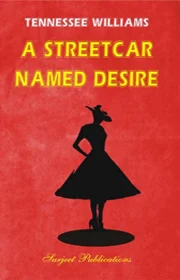
“A Streetcar Named Desire” is a classic play written by Tennessee Williams that unfolds in the vibrant city of New Orleans. The story revolves around Blanche DuBois, a fragile and troubled woman who arrives at her sister Stella’s home seeking refuge from a troubled past. As the layers of Blanche’s mysterious history gradually unravel, tensions escalate between her and Stella’s husband, Stanley Kowalski. The play explores themes of desire, deception, and the clash between old and new Southern values, creating a compelling and emotionally charged narrative that delves into the complexities of human relationships.
Read A Streetcar Named Desire Flipbook:
Listen to A Streetcar Named Desire Audiobook:
Title: “A Streetcar Named Desire”
Author: Tennessee Williams
Genre: Drama, Southern Gothic
Publication Year: 1947
Setting: New Orleans, Louisiana
Main Characters:
• Blanche DuBois: Fragile and troubled woman seeking refuge.
• Stanley Kowalski: Stella’s husband with a confrontational personality.
• Stella DuBois: Blanche’s sister caught between family and marital loyalty.
Themes:
• Desire and its consequences
• Deception and self-delusion
• Clash of old and new Southern values
Adaptations:
• The play was adapted into a successful film in 1951, starring Vivien Leigh and Marlon Brando.
• Numerous stage productions and revivals have taken place worldwide.
Legacy:
• Received critical acclaim and won the Pulitzer Prize for Drama in 1948.
• Considered a classic in American literature and theater.
• Explores complex human relationships and psychological depths.
Original Title: Tennessee Williams initially titled the play “The Poker Night” before changing it to “A Streetcar Named Desire.”
Character Inspiration: The character of Blanche DuBois was reportedly inspired by Williams’ own sister, Rose, who struggled with mental health issues and underwent a lobotomy.
Streetcar Line: The streetcar mentioned in the title refers to the Desire streetcar line in New Orleans, reflecting the symbolic journey and desires of the characters.
Marlon Brando’s Influence: Marlon Brando’s portrayal of Stanley Kowalski in the 1951 film adaptation is considered iconic. His method acting style brought a new level of realism to the character.
Vivien Leigh’s Connection: Vivien Leigh, who played Blanche in the film, also portrayed another iconic Southern character, Scarlett O’Hara, in “Gone with the Wind.”
Pulitzer Prize Controversy: Despite winning the Pulitzer Prize for Drama, there was some controversy surrounding the decision due to the play’s mature themes and the desire for a more uplifting choice.
Musical References: The play contains numerous musical references, including the haunting tune “Paper Moon,” which is associated with Blanche’s past.
Cultural Impact: Phrases from the play, such as “I have always depended on the kindness of strangers,” have become ingrained in popular culture.
Adaptations and Revivals: “A Streetcar Named Desire” has seen various adaptations, including operas and ballets, and continues to be a popular choice for theater revivals around the world.
Symbolism of Light: The use of light is symbolic in the play, with Blanche often avoiding bright light to conceal her age and troubled past, reflecting her desire to live in a world of illusions.